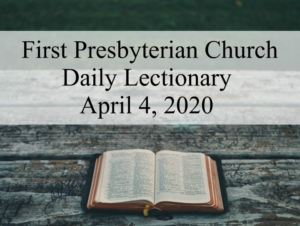
First Reading Exodus 10:21-11:8
Second Reading 2 Corinthians 4:13-18
1 Hear my prayer, O LORD;
give ear to my supplications in your faithfulness;
answer me in your righteousness.
2 Do not enter into judgment with your servant,
for no one living is righteous before you.
3 For the enemy has pursued me,
crushing my life to the ground,
making me sit in darkness like those long dead.
4 Therefore my spirit faints within me;
my heart within me is appalled.
5 I remember the days of old,
I think about all your deeds,
I meditate on the works of your hands.
6 I stretch out my hands to you;
my soul thirsts for you like a parched land. Selah
7 Answer me quickly, O LORD;
my spirit fails.
Do not hide your face from me,
or I shall be like those who go down to the Pit.
8 Let me hear of your steadfast love in the morning,
for in you I put my trust.
Teach me the way I should go,
for to you I lift up my soul.
9 Save me, O LORD, from my enemies;
I have fled to you for refuge.
10 Teach me to do your will,
for you are my God.
Let your good spirit lead me
on a level path.
11 For your name’s sake, O LORD, preserve my life.
In your righteousness bring me out of trouble.
12 In your steadfast love cut off my enemies,
and destroy all my adversaries,
for I am your servant.
In the Gospel of Luke the disciples ask Jesus, “Lord, teach us to pray.” Jesus responds with the Lord’s Prayer. He might have done just as well to open Psalms. The book is the hymnal of Israel and the ancient Church. It is also the place where God teaches us to pray. Some of it is deeply familiar—“The Lord is my shepherd I shall not want.” It provides language that saturates our worship, even if unnoticed—“I will lift up the cup of salvation and call on the name of the Lord” and “May the words of my mouth and the meditation of my heart be pleasing to you,” and “God is our refuge and strength, a very present help in trouble,” and “the heavens are telling the glory of God and the firmament proclaims God’s handiwork.” You get the picture. Psalms is the most quoted book in the New Testament, which suggests that knowledge of the Psalms is important for our understanding of the saving work of God. Over time, we can grow familiar with parts of the Psalms as a way of deepening our knowledge of God, which can manifest in our relationship with God through prayer. Psalm 143 is one of these for me, an old friend. I remember reading it some years ago in a place where I did not want to be, where the words of David, pursued by enemies, seemed resonant in my life—” my spirit faints within me; my heart within me is appalled.” Over the course of the Psalm something happened, and David’s prayer became my own. So when I asked in earnest, “teach me the way I should go, for to you I lift up my soul,” God responded by lifting the veil from my eyes and allowing me to realize my call to ministry. (If you try this prayer, don’t say I didn’t warn you.) Today it reminds me that God hears and answers—and that we have the words that God promises to hear.
Hear my prayer, O LORD; give ear to my supplications in your faithfulness; answer me in your righteousness. Let me hear of your steadfast love in the morning, for in you I put my trust. Teach me the way I should go, for to you I lift up my soul. Save me, O LORD, from my enemies; I have fled to you for refuge. Teach me to do your will, for you are my God. For your name’s sake, O LORD, preserve my life. In your righteousness bring me out of trouble. Amen.
